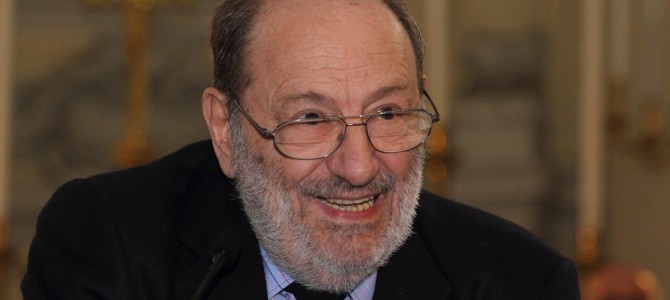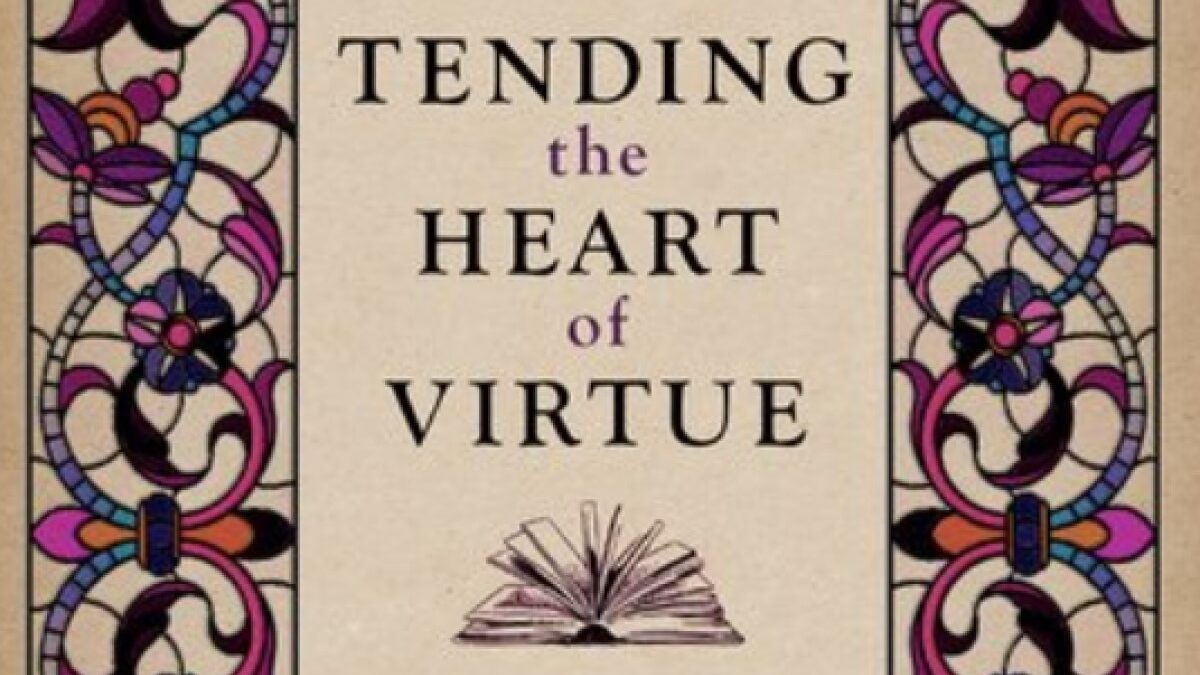
Postmodernism has taken a bit of a beating in these and other conservative pages of late. And, frankly (specifically Frankly), there is good reason for this. The French version of PoMo found in the works of Derrida, Deleuze, and others is indeed a recipe for moral and social relativism, and it is right to attack them.
But like most things, postmodernism is not an unmitigated evil. In the hands of Italian novelist Umberto Eco, who died last week, postmodernism was not an attack on Western cultural norms. It was a celebration of them.
The foundation of postmodernism and semiotics, its branch of philosophy, is a belief that stories and texts build upon each other throughout history. For the French practitioners this led to a confusing confession that nothing can really be known. But for Eco, this study of how the world’s knowledge folds into itself and reproduces was a positive, not a negative force. Eco put it this way in 1994, writing about how his first novel, “The Name of the Rose” employed postmodern theory:
The postmodern reply to the modern consists of recognizing that the past, since it cannot really be destroyed, because its destruction leads to silence, must be revisited: but with irony, not innocently. I think of the postmodern attitude as that of a man who loves a very cultivated woman and knows that he cannot say to her ‘I love you madly’, because he knows that she knows (and that she knows he knows) that these words have already been written by Barbara Cartland. Still, there is a solution. He can say ‘As Barbara Cartland would put it, I love you madly’. At this point, having avoided false innocence, having said clearly that it is no longer possible to speak innocently, he will nevertheless have said what he wanted to say to the woman: that he loves her in an age of lost innocence. If the woman goes along with this, she will have received a declaration of love all the same. Neither of the two speakers will feel innocent, both will have accepted the challenge of the past, of the already said, which cannot be eliminated; both will consciously and with pleasure play the game of irony… But both will have succeeded, once again, in speaking of love.
Eco is aware that when we reference the past it cannot be a neutral statement of fact. It can only be an interpretation. But for Eco this does not mean we can’t really know anything. Instead, it suggests that epistemology, the study of knowledge, must consider the frame as well as the picture.
The Ethics of the Chaosmos
Eco is a writer who can be spoken of in the same breath as James Joyce or even Shakespeare. Reading an Eco novel is a feat. He challenges his readers with universes that rarely make sense. The religious faith of his characters is challenged at every turn— but it is never vanquished. Eco is a never agnostic. Whether in “The Name of the Rose” or “Foucault’s Pendulum,” room is always left for faith to be on the right side of history.
In his masterful book on Joyce, “The Aesthetics of the Chaosmos,” Eco writes: “Ulysses begins with an act of Rebellion, a liturgical parody, and a fireworks of destructive, scornful fraternity jokes. While in the first chapter Stephen reconfirms the crisis of religious education, in the second chapter he indicts the teachers of his civil training, the generation of well brought up people, the pontiffs of reactionary and philistine prejudice. Finally in the third chapter he launches an attack against philosophy.”
As is often the case when a great artist treats of another, the former betrays more of himself than he does of his subject. “The Name Of The Rose” is a great example. Surely his mystery tale of the lustful monk is a fraternity joke, a parody meant to expose the confused and contradictory edicts of Catholicism regarding sex.
Eco explores the nature of lust, and how it might be brought in line with the monastic sexual mores of the Catholic Church. Importantly, however, Eco rarely harshly judges the Catholic ethos. Rather he gathers that those of us tied to that faith struggle constantly. There is never a clear answer. His tale of a monk’s temptation is the tale of all our temptations. And he judges the best of us no more than he would the least of us.
In Eco’s second chapter, he gives us “Foucault’s Pendulum.” This book explains his obsession with Joyce. It is difficult. Its narrative plays by none of the rules. In this work Eco gives us tantalizing hints about the secrets of the Templars and G-d and everything. It is less a novel than a chaosmos. It’s hard reading, but its rewards are plentiful.
Finally, in the more recent “The Prague Cemetery” Eco assails and condemns the progenitors of “true philosophy.” The book is a game of identity that focuses on the creation of the “Protocols of the Elders of Zion.” We are shown in no uncertain terms that hatred, bigotry, and racism can occupy the heady air of wisdom as surely as kindness, equality, and love can. At every turn Eco asks the best of us.
One Must Understand all Traditions
Eco’s contemporary, Gabriel Garcia Marquez, also densely packed his work with allusion, although he did it from an altogether different angle. But if one reads his famous “100 Years of Solitude” while remembering the nature of history and oral traditions, the thread becomes more apparent. From start to finish, the book traces not just the lives of the protagonists—the Buendia family—and all the colorful characters they encountered, but the changing nature of society and relationships.
In the end, Marquez’s magical realism, informed by modernism, takes “100 Years of Solitude” in an opposite direction from Eco’s. Whereas Marquez, and the postmodernity he represents, eschew the miraculous in favor of the terrestrial, Eco believed understanding the Bible was essential to understanding Western culture.
In a 2009 article published in The New York Times, Eco wrote about witnessing several teenagers taking in art. One was looking over a book of reproductions, wide-eyed, and the other two were enamored of works in the Louvre. They weren’t truly able to appreciate what they were viewing, Eco noted: “it was difficult for them to fathom why Fra Angelico portrayed a girl talking to a man with wings in ‘The Annunciation’ or why in Rembrandt’s ‘Moses Breaking the Tablets of Law,’ a gentleman who looks rather down-at-the-heels but has beams of light shining from horns on his head, is bounding down a mountainside carrying two heavy stone tablets.”
Rather than arguing wholly against the magical realism of authors like Marquez and the teachers who share his views, Eco continued that it’s important not just to understand the Christian tradition, but all traditions. This is where he stood apart and reached a pinnacle that many do not.
Others assumed they could transcend the works and the words that informed their storytelling, their understanding of how the world came to be as it is. They assumed we can forget those foundational truths and progress along merrily without first building our frame upon rock. Of course this is folly. We cannot transcend when we build our houses upon sand; we need the rock to provide us stability so we may reach upwards and achieve the progress of which we dream.
Umberto Eco Connected Himself to His Culture Instead of Repudiating It
This is also where Eco stood apart—in recognizing that our culture cannot be a predetermined utopia bereft of ancient truth, but rather it must be a continuation of that truth. He recognized that while remembering the past likely still dooms us to repeat it, it’s better than forgetting it and embracing our repeated failure.
Without magi, we lose our sense of seemingly reckless abandon in pursuit of a higher purpose. Without wise men, we cannot understand the significance of Siddhartha and his decision not to focus on the camel, but the eye of the needle (albeit in an entirely different tradition). We cannot fathom that Siva will destroy before bringing happiness, albeit not with a mighty flood.
In other words, while we can attempt to make sense of the world around us—of the good and bad, the obstacles and chances for newness, the dichotomy of good and beauty—we cannot fully do so without understanding the ancient texts that have led us to this point. We cannot disavow as dated, misguided, foolish, or irrelevant the traditions that have guided us here. Even if we do not ourselves believe, we must first understand. To do otherwise is to say that ignorance is a source of strength and the rocks of our culture were actually laid on sand.
This is tempting, and extremely prevalent in the modern world, but not philosophically coherent. It’s beyond postmodernism and into territory that suggests we are but products of our minds. While such ideas lend themselves to an entertaining-enough movie trilogy, they are wholly insufficient for the yeoman’s work of actually continuing to create and recreate our lives and civilizations.









